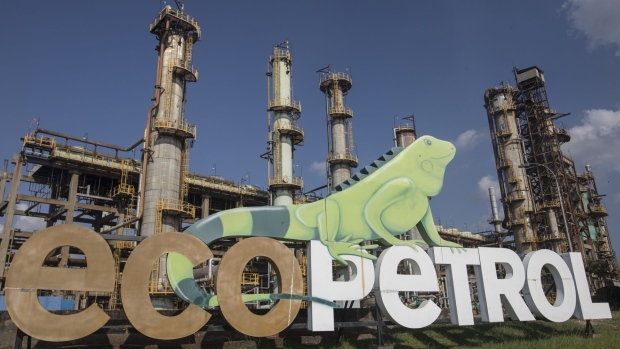Feb 1, 2023
Ecopetrol Mulls Sustainability-Linked Bond From Power Grid Unit
, Bloomberg News

(Bloomberg) -- Ecopetrol SA, the Colombian government-owned oil company that sold dollar bonds last month, is considering a new offering of sustainability-linked bonds out of its investment-grade power transmission and infrastructure unit Interconexion Electrica SA.
“The next milestone that we want with ISA is to have a sustainability-linked bond,” Ecopetrol’s Chief Financial Officer Jaime Caballero Uribe said in an interview. ISA has several options in terms of environmental financing because “it’s already a certified carbon neutral company.”
Bogota-based Ecopetrol took a 51.4% stake in ISA in 2021. It pushed ahead with the $3.7 billion transaction for the company — which also operates power grids, telecommunications towers and highways in Latin American countries including Brazil and Chile — allowing it to benefit from more predictable revenue streams, partially offsetting volatility in oil and gas prices.
Sustainability-linked bonds generally penalize issuers with higher borrowing costs if they don’t meet certain environmental, social and governance (ESG) metrics. In contrast to green bonds, companies can use deal proceeds as part of their general funding plans. While sales of sustainability-linked bonds are picking up, they are still a relatively small portion of total ESG bond issuance.
Ecopetrol last month issued $2 billion of 10-year bonds to in part repay coming debt maturities, including a portion of a loan used to buy ISA, the company said in a Jan. 10 statement. The transaction was priced to yield 9%, or almost twice what it paid to issue bonds with a similar maturity in October 2021 before major central banks including the Federal Reserve initiated a series of rate hikes.
“There was a lot of repressed appetite from investors,” said Caballero, adding that after the latest debt transactions, Ecopetrol has $1 billion of maturities due this year. “We will continue to monitor the market and if we see good opportunities, depending on how the market evolves, we will tackle,” them.
Last week, Ecopetrol bond prices declined after the company said its CEO Felipe Bayon was stepping down amid Colombian President Gustavo Petro’s push to transition the country to renewable energy, which includes halting new oil and gas exploration contracts, while only allowing existing deals to continue.
The company’s currency strategy “seeks to balance the need for sustainable value in the short and medium term with the need to transition and diversify and lower our carbon footprint, That’s what the strategy does. We’ve discussed that with the government and that the strategy in a very large sense, response to the government priorities,” Caballero said. “The discussion in which we are in is more discussion around the pace at which some of these investments need to take place,” he said, and added that the company is going to be able to hire someone with similarly widely-recognized professional skills as Bayon.
ISA has higher credit ratings than its parent company, potentially allowing it to access cheaper funding costs. Fitch Ratings grades ISA at BBB, its second lowest investment grade, or two levels above Ecopetrol. Moody’s Investors Service, which has Ecopetrol at Baa3, its lowest investment grade, while it rates ISA one grade higher at Baa2.
In the longer term, the company may consider raising other kinds of so-called ESG financing for its projects related to emerging technologies such as the production of hydrogen or carbon sequestration, he said. It’s currently focused on structuring the projects, including finding partners and government incentives, he said.
While the company will continue increasing its footprint into cleaner technologies, Ecopetrol is also expanding its presence in the US and Asia, its biggest export markets. Last year, it opened a commodity trading office in Singapore and it’s in process of opening another one in Houston.
--With assistance from Caleb Mutua, Ezra Fieser, Patricia Laya and Andrea Jaramillo.
©2023 Bloomberg L.P.





